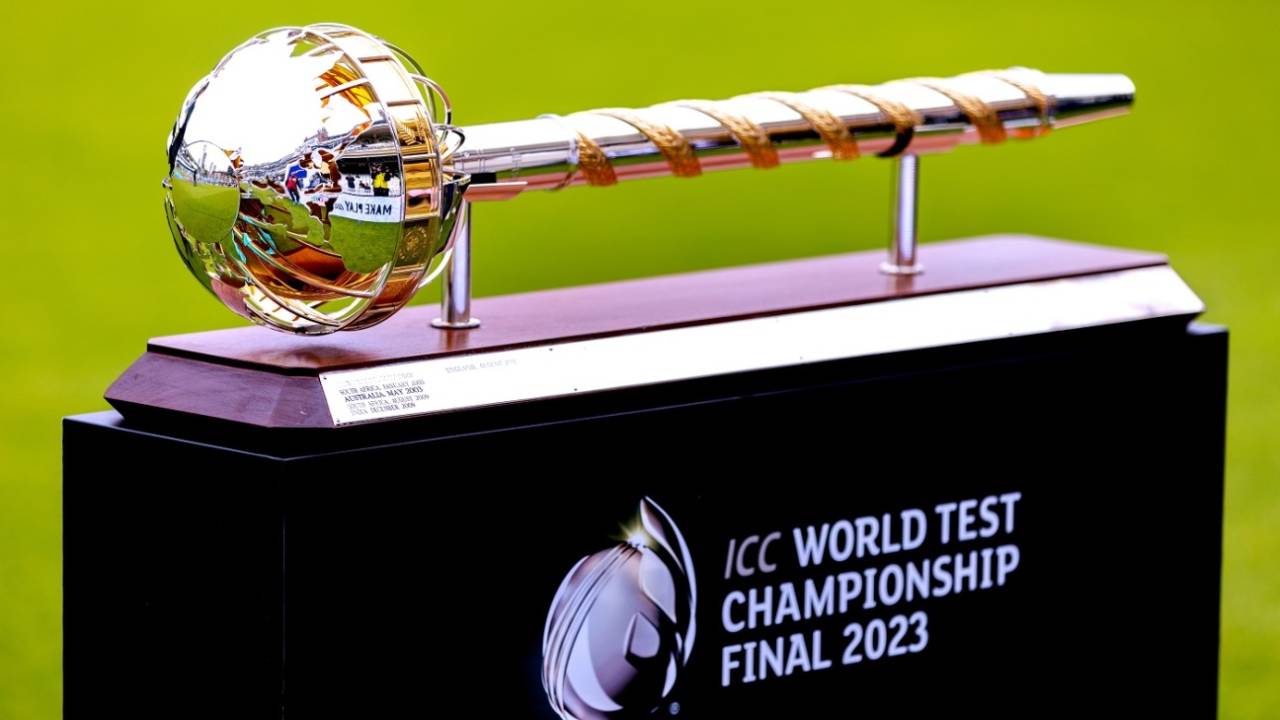ICC 'looking at in-game penalties for Tests' in the next WTC cycle
ICC chair Greg Barclay and CEO Geoff Allardice expand on some of the decisions taken at the governing body's AGM
The World Test Championship mace on display • Getty Images
Barclay: It is a landmark decision. We had mooted to have genuine parity put in place by 2030. So I'm delighted, and so is the board, that we've managed to fast forward that by six years. And it's the right thing to do. This organization values inclusivity and equity. So equalizing gender pay and reaching parity is absolutely the right thing to do.
'Frustrating when you get stung for entertaining' - Khawaja plays key role in over-rate penalty reduction
Slow over-rate penalty - extra fielder inside circle to be introduced in ODIs too
BCCI set to get nearly 40% of ICC's annual net earnings
ICC agrees overseas players cap for new T20 leagues
ICC announces equal prize money for men's and women's World Cups

Allardice: The scale of the fines is not having any material impact on the pace of play. The men's cricket committee looked at the fines and the suggestions and then certainly balanced the level of fines that are being applied. They were very strong at the points deductions for over-rate penalties in the World Test Championship (WTC) to remain in place. Teams that do not heed the minimum pace of play jeopardise their opportunity to qualify for the WTC final. The men's cricket committee is looking at potential in-game penalties come the next cycle of the WTC.
Allardice: We reflected on the last four years of men's ODI cricket Super League with each of the 13 teams being able to play 24 ODIs [each]. Netherlands getting through to the ten-team World Cup is an outstanding achievement. Each of the seven teams in League 2 played 36 ODIs, and in the Challenge League - Group A and Group B - where there are 12 teams, they played 15 List A matches each. So our commitment to the format is as strong as ever. The 50-overs World Cup will be an outstanding success in India in a couple of months' time. What it looks like moving forward [remains to be seen, though] one of the discussions is always about how can we create greater context in the bilateral cricket calendar.

Allardice: There are existing events that are already subject to existing commercial agreements and any roadmap to moving towards the new regulations and the limits in those will be determined on a case by case basis. So it's not a straightforward answer within a timeframe.
Barclay: The position of the ICC at the moment is that the next revenue distribution model is going to allocate significantly more money to each of the Test-playing countries. How they utilise their money is up to them in terms of bilateral discussions. If they choose to apply some of that to playing Test cricket, then hopefully they'll now have the means to do so. There's been no real discussion around creating a Test fund because it's probably no great need to have at the moment given the amount of money that they should be able to utilise.
Barclay: We recognize that it's a pretty difficult situation in Afghanistan. The position there obviously runs counter to the ICC's stated intentions to run a totally inclusive and diverse organisation. We've got one member that, through no fault of their own, has had regulation imposed on them, which means that they are simply incapable of playing or supporting women's cricket at the moment. In the last set of board meetings, there was a renewed focus on what is needed to be done to support the member to help them fast track that.
